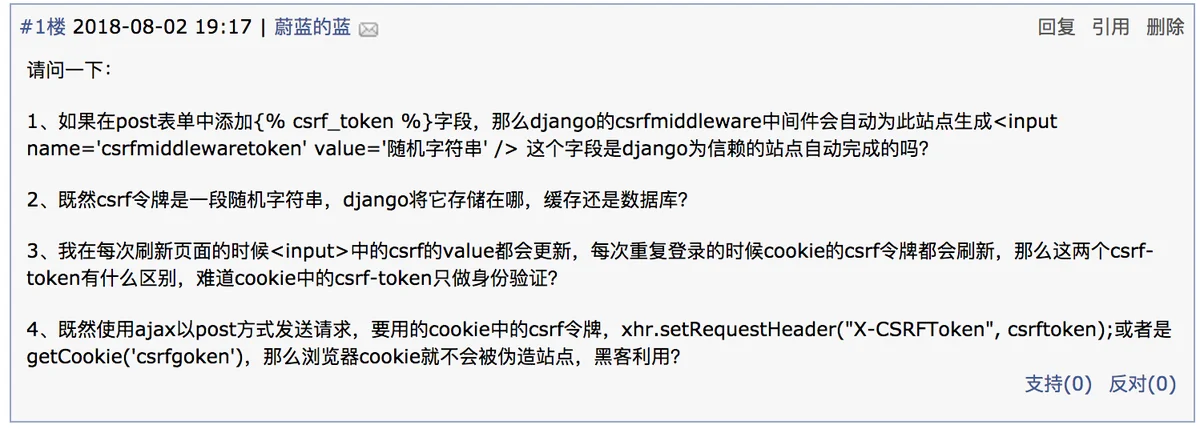我多年没维护的博客园,有一篇初学Django时的笔记,记录了关于django-csrftoekn使用笔记,当时几乎是照抄官网的使用示例,后来工作全是用的flask。博客园也没有维护。直到我的博客收到了如下评论,确实把我给问倒了,而且我也仔细研究了这个问题。
1. Django是怎么验证csrfmiddlewaretoken合法性的?
2. 每次刷新页面的时候<input>中的csrf的value都会更新,每次重复登录的时候cookie的csrf令牌都会刷新,那么这两个csrf-token有什么区别?

image.png
CSRF(Cross Site Request Forgery protection),中文简称跨站请求伪造。
django 第一次响应来自某个客户端的请求时,会在服务器端随机生成一个 token,把这个 token 放在 cookie 里。然后每次 POST 请求都会带上这个 token,
这样就能避免被 CSRF 攻击。
这样子看起来似乎没毛病,但是评论中的第三个问题,每次刷新页面,form表单中的token都会刷新,而cookie中的token却只在每次登录时刷新。我对csrftoken的验证方式起了疑问,后来看了一段官方文档的解释。
When validating the ‘csrfmiddlewaretoken’ field value, only the secret, not the full token, is compared with the secret in the cookie value. This allows the use of ever-changing tokens. While each request may use its own token, the secret remains common to all.
This check is done by CsrfViewMiddleware.
官方文档中说到,检验token时,只比较secret是否和cookie中的secret值一样,而不是比较整个token。
我又有疑问了,同一次登录,form表单中的token每次都会变,而cookie中的token不便,django把那个salt存储在哪里才能保证验证通过呢。直到看到源码。
def _compare_salted_tokens(request_csrf_token, csrf_token): # Assume both arguments are sanitized -- that is, strings of # length CSRF_TOKEN_LENGTH, all CSRF_ALLOWED_CHARS. return constant_time_compare( _unsalt_cipher_token(request_csrf_token), _unsalt_cipher_token(csrf_token), ) def _unsalt_cipher_token(token): """ Given a token (assumed to be a string of CSRF_ALLOWED_CHARS, of length CSRF_TOKEN_LENGTH, and that its first half is a salt), use it to decrypt the second half to produce the original secret. """ salt = token[:CSRF_SECRET_LENGTH] token = token[CSRF_SECRET_LENGTH:] chars = CSRF_ALLOWED_CHARS pairs = zip((chars.index(x) for x in token), (chars.index(x) for x in salt)) secret = ''.join(chars[x - y] for x, y in pairs) # Note negative values are ok return secret
token字符串的前32位是salt, 后面是加密后的token, 通过salt能解密出唯一的secret。
django会验证表单中的token和cookie中token是否能解出同样的secret,secret一样则本次请求合法。
同样也不难解释,为什么ajax请求时,需要从cookie中拿取token添加到请求头中。
网上有不少关于django csrf token验证原理的文章都是错的,是因为他们根本不知道csrf-token的结构组成,我也是卡在第三条评论那.然后看了官方文档,和CsrfViewMiddleware中间件源码然后才恍然大悟。
